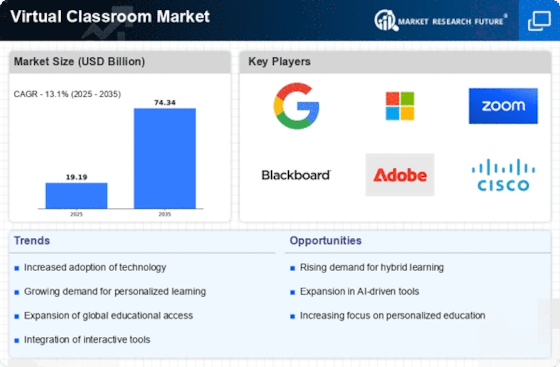Top Industry Leaders in the Virtual Classroom Market

Competitive Landscape of the Virtual Classroom Market
The virtual classroom market is experiencing explosive growth, fueled by the convergence of digital transformation, the pandemic's lasting impact on education, and a rising demand for accessible and flexible learning solutions. This dynamic landscape is teeming with established players, agile startups, and an array of strategies vying for market dominance.
Key Players and Their Battlegrounds:
- BrainCert (US)
- SAP SE (Germany)
- Docebo (Italy)
- Saba Software (US)
- Skyprep (Canada)
- Oracle Corporation (US)
- Edvance360 (US)
- Brainier (US)
- Bluevolt (US)
- Canvas (US)
Strategies for Success:
- Platform Differentiation: Providers compete based on user experience, feature richness, and integrations with third-party tools. Offering intuitive interfaces, advanced collaboration features, and data analytics dashboards are key differentiators.
- Content and Curriculum Integration: Seamless integration with existing educational content and curricula is crucial for adoption by academic institutions. Partnerships with publishers and content creators are vital for offering diverse learning resources.
- Security and Privacy: Data security and student privacy are paramount concerns. Robust security measures and compliance with data privacy regulations are non-negotiables for gaining trust and market share.
- Pricing and Accessibility: Flexible pricing models catering to diverse budgets and learner segments are essential. Freemium models, tiered subscriptions, and pay-per-use options attract different user groups.
Market Share Analysis: Factors to Consider:
- Target Market Focus: Players focusing on specific segments like K-12 education, higher education, or corporate training have a potential advantage over one-size-fits-all solutions.
- Regional Variations: Education policies, technology infrastructure, and cultural preferences differ across regions, requiring localized offerings and partnerships.
- Technology Adoption: Early adopters of emerging technologies like AR/VR and AI in virtual classrooms can stand out and attract tech-savvy institutions.
New and Emerging Companies:
- Immersive learning startups like STRIVR and Virbela are building virtual reality environments for hands-on learning in fields like healthcare and engineering.
- AI-powered learning platforms like Knewton and Century are personalizing learning pathways and optimizing student engagement through adaptive algorithms.
- Microlearning platforms like EdApp and Duolingo are catering to the growing demand for bite-sized, mobile-first learning experiences.
Current Investment Trends:
- Venture capitalists are heavily investing in virtual classroom startups with disruptive technologies and scalable business models.
- Strategic acquisitions are on the rise, with established players acquiring startups to bolster their offerings and gain access to new technologies and markets.
- Mergers and collaborations are forming between technology providers, content creators, and educational institutions for comprehensive solutions.
Recent Developments:
- Dec 2023: Meta announces a pilot program using VR headsets for immersive language learning in French and Spanish.
- Nov 2023: Microsoft launches Teams for Education Premium with advanced features like real-time translation and AI-powered insights.










